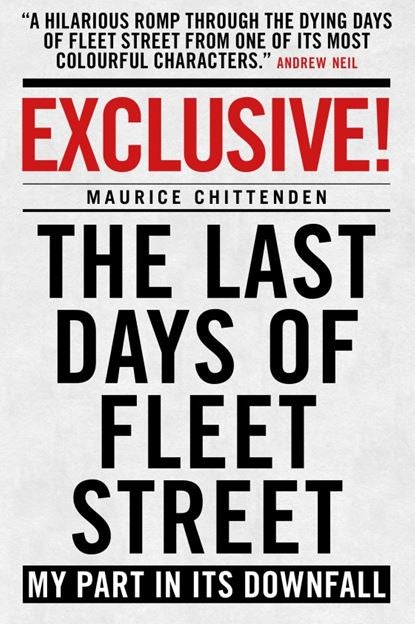
Maurice Chittenden, sacked after 30 years at The Sunday Times in August 2016, is reputed to be the most bylined reporter in the title’s history.
This extract is from his memoir EXCLUSIVE! The Last Days of Fleet Street, published by Biteback.
Catching a murderer
The murder of thirteen-year-old Caroline Dickinson on a school trip to France in the summer of 1996 shocked the nation and had every parent questioning whether such holidays would ever be safe again. Thanks to a bizarre chain of events, spanning two continents, I was able to help put her killer behind bars..
..with both the fifth anniversary of the murder and the delayed inquest into Caroline’s death coming up, I decided to dig deeper.
Using an interpreter to reinforce my schoolboy French, I contacted
Francis Debons, the investigating judge now leading the
murder inquiry.
How many suspects were they looking at?
“We are still seeking up to fifty people to eliminate them from our enquiries. A request has gone to Scotland Yard to help locate a man who it is known had been living in Britain before the murder.”
It was still not enough. We phoned Debons back and asked
him to give us the name of the man who had been in the UK.
We told him we needed it to make the story work.
Reluctantly he gave us the name of fifty-year-old Francisco Arce Montes, a Spanish restaurant worker.
It was enough to go on. I spoke to NCIS, the national crime
intelligence unit, and they said that if we published the name
there was a danger that this man might abscond. But I took
the view that he was in Britain in the 1990s, nobody seemed
to know where he had gone and there might be a restaurant
owner who remembered employing him and could give the
police a lead to his present whereabouts. I had discussions with
the newspaper’s lawyers on naming him and I persuaded them
it was worth the risk.
As it turned out, copies of the Sunday Times were amongst
a bundle put aboard that day’s 12.35 p.m. BA203 flight from
Heathrow to Detroit Metro Airport to be read by passengers
on the plane and in the British Airways lounge in Detroit. It
was the custom of the BA staff to put the crumpled papers on
their ticket counter when they were two days old for anyone
to read.
Tommy Ontko was a Vietnam veteran who worked as an
intelligence officer for the immigration and border protection
service at Detroit International Airport. On Tuesday 3 April, he
was walking past the British Airways desk when he saw a copy
of the Sunday Times put out for general readership.
Out of idle curiosity, he ran Montes’ name through his computer
and came up with an approximate match. He wanted to
be certain and so he spent two hours trying his best to talk to
the French authorities before he got Montes’ date of birth. It
was the same as that of the man on his computer screen.
Montes was in police custody over another attack and a DNA match proved he was Dickinson’s killer…
The press often gets stick for the sometimes intrusive way
it handles murder investigations. Milly Dowler was a case in
point. But here was an example of a newspaper helping to arrest
the killer.
King of the blankies
[Chittendon was reputed at one time to be the Fleet Street reporter with the largest collection of blank receipts (blankies, useful for submitting forged expense claims)]I stopped claiming expenses completely when I opted for voluntary
redundancy and went freelance in 2007. By then it was
all but over, anyway. The financial crisis of 2008 meant even
more belt-tightening.
Ironically, the MPs’ expenses scandal exposed by the Daily Telegraph the following year which led to prosecutions for false accounting against various parliamentarians was the final death knell.
The MPs were jailed for fraud against the taxpayer rather than against an employer who was almost complicit in any offence, but the message still got home.
By the time of the Leveson Inquiry and Operation Elveden, the culture of creative writing (at least when it came to your expenses) was dead. The Sunday Times even banned the use of taxis.
Managing editors across Fleet Street put limits of £20 per diner on entertaining contacts and demanded to see a credit card receipt.
The ‘blankie’, the blank receipt, became about as useless a piece of paper as a Zimbabwe dollar.
The Sunday Times will not even accept a genuine lunch receipt timed after 3pm. Excess of any sort is now frowned upon in the new Puritan world of the press.
But, for about forty years, this sort of behaviour was not only tolerated within Fleet Street but almost expected.
There was an understanding between the newspaper and the journalist that expenses were there to be exploited so long as you did not go
over the top.
It was a perk that suited both sides. ‘Just don’t take the piss,’ was the edict heard regularly in newspaper offices.
You have to remember that there has never been such a thing as overtime pay in journalism. Even reporters who log their extra hours and insist on taking days off in lieu are regarded as oddballs.
So when newspapers were making hay it was almost in their interests to overlook the exaggerated claim forms.
Photographers, in particular, were so keen to get blank receipts, or ‘blankies’, that they would seek to get them in advance.
One of their number would be chosen to fly out a month ahead of a World Cup tournament or Olympic Games to harvest what receipts he could. It was always lost on the office why I started a family holiday in Atlanta in 1996 three months before returning there for the Summer Games.
Getting ‘whacked’ from The Sunday Times
The day I got whacked I was telephoned at home by a man I had never met who read from a script and told me I need never come into the office again.
I did not even get a black refuse sack into which to empty the contents of my desk. Instead, someone ‘borrowed’ from underneath it the golf umbrella that was a gift from one of my sons.
Sadly, that’s how you get the bullet in newspapers these days. Journalists like to use movie imagery to put a bit of spin on the clinical way it is done.
In [former editor] Andrew Neil’s day, we spoke of the disparus, colleagues who disappeared as if overnight, so called after those who were ‘disappeared’ by the death squads in countries like Argentina and Chile. Nowadays, Mafia vocabulary is more in vogue.
Indeed, the departure of Charles Hymas, managing editor of the Sunday Times news section, in April 2017 would not have been out of place in that scene from The Godfather, when Michael Corleone is having his baby baptised at the same time his enemies are being gunned down.
Hymas, nicknamed ‘Mad Dog’ by Private Eye for a reason none of us at his leaving do could remember, is a driven journalist who was always the first to arrive and the last to leave. His departure was announced, after twenty-six years at the paper, at the very moment Martin Ivens, the editor who succeeded Witherow, was at a London Press Club awards lunch lavishing praise on his colleagues for helping the Sunday Times to win the Sunday Newspaper of the Year award.
John Witherow once told me there is no room for sentiment in newspapers and he is right. They have to be like any other business. Getting rid of me was going to save the paper tens of thousands of pounds a year.
Supposedly the trigger for my sudden departure was that I had missed a 2am deadline for Mo Farah’s 10,000-metre triumph at the 2016 Olympics in Rio, but when delays on the track meant he didn’t cross the finishing
line until 1.57 a.m., it became a tall order.
I was also told by colleagues that executives had pored over my email account to see if I was behind a series of embarrassing stories about the Sunday Times in Private Eye’s Street of Shame column.
Of course, they found nothing, because I was not guilty and the
stories have continued. Not least about me and this book!

Email pged@pressgazette.co.uk to point out mistakes, provide story tips or send in a letter for publication on our "Letters Page" blog






